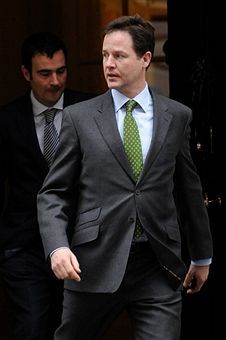 Libya is not the only scene of conflict today. Nick Clegg has just won a powerful
victory over the Conservatives, appointing a Bill of Rights commission which is certain to leave the ECHR intact. When you see the names Philippe Sands, Helena Kennedy and Lord Lester on the list
— even alongside Tories — you know that this review is over before it has begun. Clegg is a firm believer in Europe, and has played his hand very well — outmanoeuvering the
Conservatives who thought that a British Bill of Rights should supplant edicts from Strasbourg.
Libya is not the only scene of conflict today. Nick Clegg has just won a powerful
victory over the Conservatives, appointing a Bill of Rights commission which is certain to leave the ECHR intact. When you see the names Philippe Sands, Helena Kennedy and Lord Lester on the list
— even alongside Tories — you know that this review is over before it has begun. Clegg is a firm believer in Europe, and has played his hand very well — outmanoeuvering the
Conservatives who thought that a British Bill of Rights should supplant edicts from Strasbourg.
Upshot: there may still be a Bill of Rights, containing various declarations inserted by the Tories on the panel. But what the BoR says will matter not one jot. You can bet that Kennedy et al will make sure that any BoR is junior to the ECHR and capable of being overruled by Strasbourg in every respect. In this way, the British Bill of Rights would be a constitutional irrelevance. A decoy, intended to fool the media.
Had David Cameron had a year longer in office, he might not have allowed this. It matters. Concern over the ECHR may sound like a Eurosceptic obsession, but it’s a fundamental issue about power. His ministers are now seeing, on a daily basis, that the retreating Labour Party cleverly transferred a lot of power to the lefty judiciary — which didn’t matter to Labour as its plans never conflicted. But now Tory ministers find they need the lawyers’ approval before making the most basic reforms.
James Forsyth’s brilliant cover story in this week’s magazine details the frustrations of the Cabinet reformers: they have found that power has shifted to the judiciary. As James says:
“Lawyers are the masters now. In each government department, the final word often rests with them. Ministers live in fear of being warned that they are on ‘unsound legal ground’ — and they are warned all too regularly. They suspect, with justification, that the QCs on civil servants’ speed dial are usually from left-wing chambers. Things are so bad that in at least one instance, a minister asked the Conservative party for advice on whether a policy he wanted to pursue was legal or not. ‘You can, in theory, defy the lawyer,’ says one minister. ‘But if you spent tens of thousands of pounds on a legal action which you then lost, and it emerged that you were advised not to fight, you would be in an awkward position.’ The result is, again, a sense of powerlessness, even loneliness. It is felt across government.”
This won’t change. So we should reluctantly acknowledge two very clever and effective manoeuvres here. Labour brilliantly passed power to the lawyers — and so bamboozled the Tories that they even voted for Harman’s Equalities Act, not realising it was laden with booby traps hungry for Tory flesh. The next victory is Clegg’s, who has today ensured that this system will stay in place. The losers are the 60 per cent of the British public who resent the ECHR.
Cameron has other battles to fight now, so it’s time to accept that it’s game over for legal reform. The stealth power transfer won’t be reversed by this coalition government. It’s time to accept that Britain, like America, now has a system where an activist judiciary decides laws — often in defiance of democratically-elected governments. Given that this is the case, these activist lawyers should be open to the same level of public scrutiny as they are in America — where the appointment of judges is done in the full glare of publicity and their background is checked. Our judicial elite are appointed in far murkier systems, often from highly-politicised chambers.
The system England has now is profoundly undemocratic, and is regarded as such by the public (hence the antipathy to the ECHR). Having failed to restore power to parliament, it’s time to admit we’re in an era of judicial activism. The least we can do is adjust for it with the proper democratic checks and balances.
PS – The full panel members are below. All have interest in ECHR, but only the Liberal side specialise in it.
FOR REFORM: THE TORY SIDE
* Martin Howe. Specialism: Intellectual property law, EU law, commercial law. Early advocate of British Bill of Rights
* Jonathan Fisher. Specialism: business law. Five years ago, he outlined a potential British Bill of Rights in a Conservative pamphlet critical of the Strasbourg court.
* Anthony Speaight. Specialism: commercial law. Author of Human Rights Act – Legal Pathways for Conservative Lawyers in 2007, describing how he thinks a British Bill of Rights could be enacted.
* Michael Pinto-Duschinsky: political academic who wrote Bringing Rights Back Home for Policy Exchange. Has no legal expertise, as he demonstrated when giving evdience to the Select Committee on Tuesday.
AGAINST REFORM: THE LIBERAL SIDE
* Lord Lester. A specialist on Human Rights and an architect of the original Human Rights Act that he¹ll be in no rush to undermine.
* Helena Kennedy. A leading Human Rights expert, also key to making sure Labour introduced the HRA.
* Philippe Sands is also a leading Human Rights lawyer, who specialised in hounding Blair over Iraq and wrote a book about it.
COULD GO EITHER WAY
* Sir David Edward A former judge in the European Court of Justice and an expert on EU law.







Comments